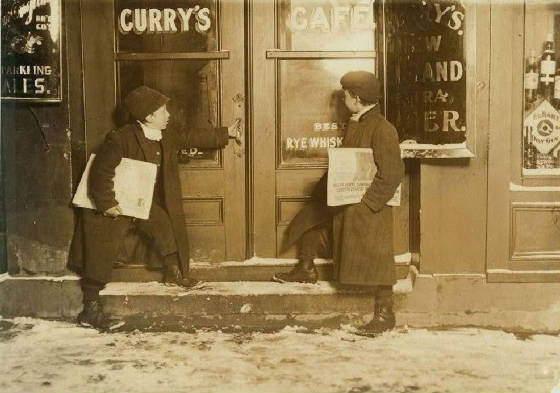
Lewis Hine caption: 9:30 P.M. A common case of “team work.” Smaller boy (Joseph Bishop) goes into [one of the?] saloons and sells his last papers. Then comes out and his brother gives him more. Joseph said, “Drunks are me best customers.” “I sell more’n me brudder does.” “Dey buy me out so I kin go home.” He sells every afternoon and night. Extra late Saturda[y. At] it again at 6 A.M. Sunday, Hartford, Conn. Location: Hartford, Connecticut, March 1909.
“When I was young, Uncle Joe would take us down to the boardwalk and do things with us. We would go on the merry-go-round and win dolls at the arcade.” -Stephanie Pressman, niece of Joseph and Meyer Bishop
The following are excerpts from an article in the New London Day (Connecticut)
“Hartford, March 18, 1909: The committee on education held a hearing in the senate chamber on a number of measures relating to children. They were on the bulletin in the following order: House bill No. 254 repealing act relating to the attendance of children, between 14 and 16 years at school; House bill No. 349 concerning the employment of children under 16 years in mechanical and mercantile establishments; House bill No. 197 relating to the issuance of certificate upon certain educational qualifications; House bill No. 196 concerning the attendance of school children under 16 years of age at school; Senate bill No. 66, providing that girls under 16 years of age shall not sell papers on the streets, etc., and that boys under 15 years shall not be employed at manufacturing or mechanical pursuits, or in theatres, or bowling alleys; Senate bill No. 65 for the regulation of street trades for boys; House bill 196 concerning the attendance of school children under 16 years; House bill No. 251 for the appointment of a commission by the superior court on the matter of location of schools.”
“Mr. Lord of Boston, the secretary for New England of the National Child Labor Committee, speaking on bills No. 65 and 66, said that in the states which have eight hours a day, the minimum age has been fixed at 16 years. Everyone appreciates the necessity of giving as much time as possible to the training of youth. He wished it were possible that boys and girls should be prevented from working for wages before they had reached the age of 16 years. In regard to street trades, he said it was a new question. He has a great many friends among the newsboys. He objected to the employment of girls on the streets at any age.”
“They have precocity which has its disadvantages. They suffer in health and morals. Some of them go to work at 5 or 6 o’clock in the morning and they work again in the evening. They appeal to the sympathies of passersby. Street trades lead to begging in many instances. The boys often go into the saloons for customers. Mr. Lord introduced a number of photographs showing groups of boys and children. He saw a messenger boy at 12 o’clock Monday night at a place in Hartford which, in his opinion, was a house of ill repute. The boy told him stories of unspeakable and unprintable foulness. He showed the pictures of messenger boys taken by Hartford photographers by flashlights.”
“In reply to Attorney Joseph L. Barbour, Lewis W. Hine, the photographer, said he took the pictures of the boys introduced by Mr. Lord. One of the pictures showed a boy standing at the door of a saloon with his hand on the knob. The boy stood still at his request while his photograph was taken. Mr. Hine also said that he paid some of the boys five cents for their time.”
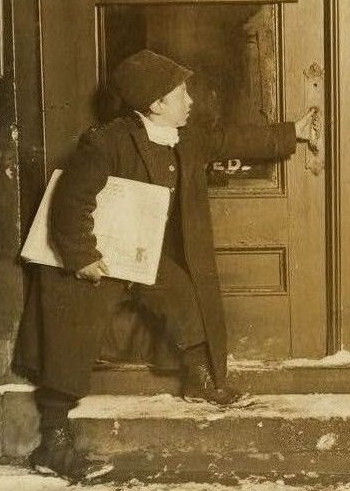
The scheme practiced by the Bishop brothers was played out on urban streets all the time back in the days of Hine’s investigations. He took 40 photographs of newsboys and newsgirls in Hartford in the first and second weeks of March, and then headed to New Haven and Bridgeport, right after he testified before a session of the state legislature. He was in Connecticut to photograph newsies and messenger boys precisely because of the child labor and school attendance laws being considered at that time.
The 1910 census revealed that Joseph’s unnamed brother in the picture was Meyer (some records spell it Myer). According to the census and the Hartford city directories, Curry’s Café was owned by John J. Curry, 34 at the time of the photograph, and married with no children. He was born in Ireland and entered the US through Ellis Island in 1901. The café (called a saloon in the directory) was located in downtown Hartford at 184 State Street, an area which was totally redeveloped in the 1960s to accommodate Constitution Plaza, a large office and retail center.
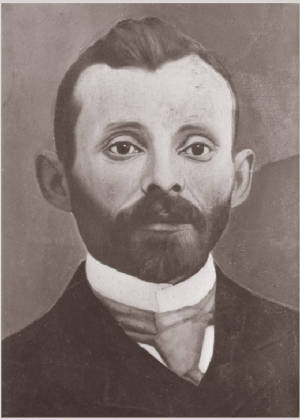
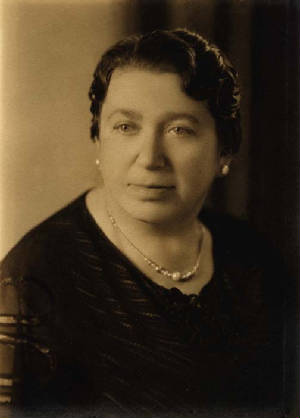
The Bishops were a Yiddish-speaking Jewish family. The name was originally Bischoff. Jacob immigrated to the US from England in the early 1900s, and then his family followed him in 1907. According to the 1901 England census, Jacob Bishop, a 26-year-old Russian-born grocer, was living in Manchester with his wife, Yetta (later called Ethel), also from Russia, and three children, including Meyer and Joseph. They had married in 1896.
In 1910, they were in living in Hartford, at 5 Goodman Place, which was just north of downtown, off Main Street. Goodman Place no longer exists, and may have been eliminated when Interstate 84 was built. Jacob was a fruit peddler. He and Ethel had seven children by that time. According to several articles in the Hartford Courant, Jacob sold a grocery business at 21 Kennedy Street, in 1912, and then bought a grocery store at 42 Bellevue Street, in 1913. He passed away in 1916. Ethel died in 1962. I located several descendants after finding Meyer’s obituary.
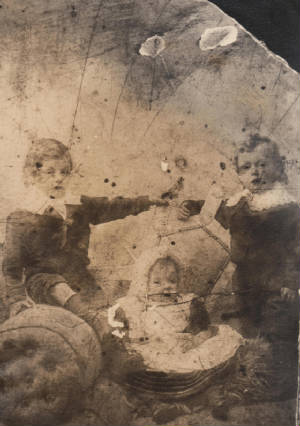
Meyer H. Bishop was born on October 7, 1896. He moved to Los Angeles in about 1923, and worked in the movie industry. At one point, he ran Columbia Pictures Grip Department. He married Eva Oster in about 1926, and they had three children: Jack, Joseph and James. He died in Los Angeles on November 12, 1962, at the age of 66. I was unable to find the whereabouts, or the death records of Meyer’s children.
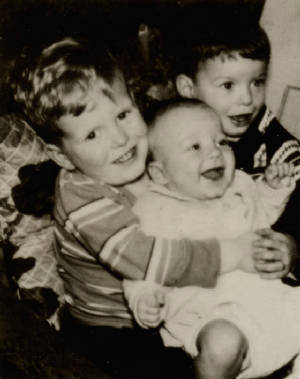
John Joseph Bishop was born on March 15, 1898. He moved to Los Angeles, probably in the 1930s. He served in both World War I and World War II. He worked in the movie industry as a grip, which is a mechanical job. Some of his brothers, and a sister, also worked in the movie industry. He married Katherine (Kay), but had no children. Kay passed away in 1965. Joseph died in Los Angeles on March 6, 1968, nine days before his 70th birthday. He is buried at Ft. Rosecrans National Cemetery in San Diego.
I interviewed Stephanie Pressman, who is the daughter of Joseph and Meyer’s sister Doris. I also talked briefly to several other descendants.
Edited interview with Stephanie Pressman (SP), niece of Joseph and Meyer Bishop. Interview conducted by Joe Manning (JM) on June 15, 2011.
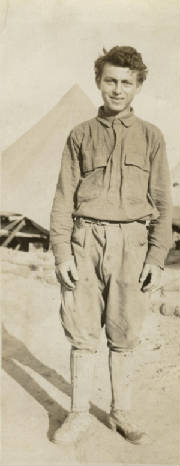
JM: When were you born?
SP: 1939.
JM: So you were 29 when your Uncle Joseph died.
SP: Yes.
JM: Did you know him well?
SP: Yes. He and his wife, Katherine, called Kay, lived in Los Angeles. I have always lived in the San Francisco Bay area, but we used to visit them quite often. When I was young, Uncle Joe would take us down to the boardwalk and do things with us. We would go on the merry-go-round and win dolls at the arcade.
JM: When did he move to California?
SP: That’s kind of a mystery. I know that he was in the war (World War I). He actually ran away from home at one point. His father abused him as a kid. He apparently beat the boys, but he didn’t abuse the girls. But when Uncle Joe ran away, I think his father had already died. That was in 1916.
JM: How do you know that his father abused him?
SP: My mother, Doris, who was his younger sister, told my brother about it. And I was told that my Uncle Meyer, Uncle Joe’s eldest brother, was very abusive with his own kids. So I suspected, when I was old enough to figure that out, that he had been abused as well. I was afraid of Uncle Meyer. He was a scary man to me. My mother didn’t like him at all. But one of my cousins doesn’t remember him that way. She said he was kind. His wife was Eva Oster. She was born in England. They had three sons, but I lost track of them a long time ago.
JM: When did your grandmother die?
SP: Not until she was about 85. She came out to California, but she had an accident later and was injured, and one of her sons brought her back to Hartford, where she eventually died.
JM: What was your Uncle Joe’s occupation?
SP: After he moved to California, his youngest brother, Ben, discovered him there. Ben was working in the movie industry along with his brothers Meyer and Sam. They were working as grips, and Ben was doing some production work. Then Ben got Joe a job as a grip. They do a lot of the mechanical things, like moving the booms, and electrical stuff.
JM: Did all of them remain in the movie industry?
SP: Yes. Ben eventually became a director. And he had a son, Mel, who became a director and did a lot of work in television. Ben had another son, Marc, who also worked for the movie industry.
JM: Your grandfather was listed in the 1910 census as a fruit peddler.
SP: They were Jewish. When they lived in England, they had a shop, and they were doing quite well. I don’t know why they decided to come to the United States. My grandfather came over first, but I’m not sure when. And then the rest of the family came over in 1907. At one time, my grandfather sold from a cart. He would go into the outlying areas and get eggs and produce and bring it into the city and sell it. My mother would often go with him and help make deals. And the older boys had to work.
JM: Was there a large Jewish population in England when they were living there?
SP: There was in Manchester, where they lived. I’m eager to go back there and do some research. I know that my grandmother had been living near Krakow, which was under Austrian rule then.
JM: Were you surprised that Joe and Meyer were newsboys?
SP: I had no inkling about it. I was so excited when you sent me the picture. Uncle Joe was a very warmhearted person, somebody that I enjoyed being with. He was very sweet to me. I think he might have enjoyed having his own children, but he and Aunt Kay never had any.
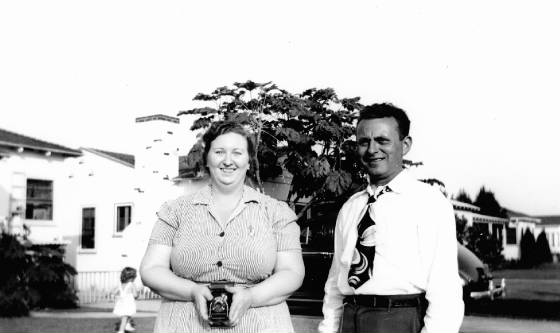
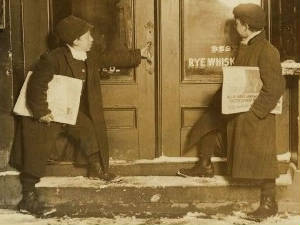
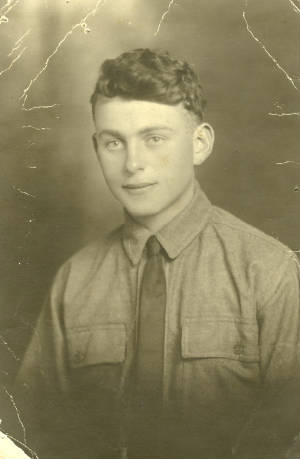
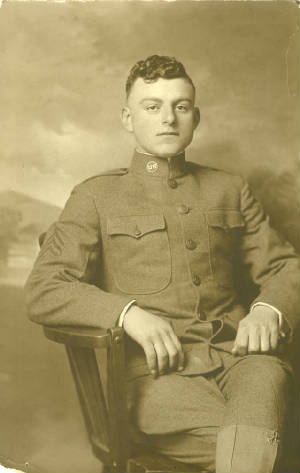
Joseph Bishop 1898 – 1968
Meyer Bishop: 1896 – 1962
*Story published in 2011.